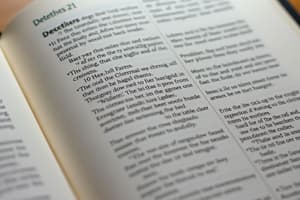Podcast
Questions and Answers
How does Deuteronomy depict the relationship between obedience and divine blessing?
How does Deuteronomy depict the relationship between obedience and divine blessing?
- Obedience guarantees immediate rewards and recognition.
- Obedience is a prerequisite for God's blessings and establishes one as a leader rather than a follower. (correct)
- Obedience is primarily a matter of personal discipline with no direct impact on one's status.
- Obedience leads to earthly prosperity, but not necessarily divine favor.
What was the primary reason the previous generation was prohibited from entering the Promised Land, according to Deuteronomy?
What was the primary reason the previous generation was prohibited from entering the Promised Land, according to Deuteronomy?
- Moses' disobedience influenced God's decision.
- Their military census numbers were insufficient to conquer the land.
- God wanted to give them a chance to repent.
- Their lack of faith and discouragement in the face of challenges. (correct)
In Deuteronomy's framework regarding the conquest of the Promised Land, what principle is emphasized concerning how God delivers on His promises?
In Deuteronomy's framework regarding the conquest of the Promised Land, what principle is emphasized concerning how God delivers on His promises?
- God ensures the Israelites face minimal resistance for claiming what is rightfully theirs.
- God orchestrates events to fulfill His promises all at once.
- God delivers on His promises gradually, challenging the Israelites to continuously rely on Him. (correct)
- God provides immediate and overwhelming victories to demonstrate His power.
What is the significance of Moses' actions in Deuteronomy 1:15 regarding the governmental structure he established?
What is the significance of Moses' actions in Deuteronomy 1:15 regarding the governmental structure he established?
According to chapter 8 of Deuteronomy, what is the divine purpose behind hardships and trials in the lives of the Israelites?
According to chapter 8 of Deuteronomy, what is the divine purpose behind hardships and trials in the lives of the Israelites?
According to Deuteronomy, what are the key requirements God expects from the Israelites?
According to Deuteronomy, what are the key requirements God expects from the Israelites?
What specific warning is given in Deuteronomy regarding those who prophesy?
What specific warning is given in Deuteronomy regarding those who prophesy?
How does Deuteronomy address the concept of unintentional manslaughter?
How does Deuteronomy address the concept of unintentional manslaughter?
Why was the tribe of Levi chosen to stand before the Lord, according to Deuteronomy?
Why was the tribe of Levi chosen to stand before the Lord, according to Deuteronomy?
According to Deuteronomy, what determines the blessings or curses that the Israelites will experience?
According to Deuteronomy, what determines the blessings or curses that the Israelites will experience?
What is the primary significance of Deuteronomy's reiteration of the Ten Commandments?
What is the primary significance of Deuteronomy's reiteration of the Ten Commandments?
How does Deuteronomy frame the idea of 'circumcision of the heart'?
How does Deuteronomy frame the idea of 'circumcision of the heart'?
According to Deuteronomy, what should the Israelites do with places dedicated to idol worship when they possess the Promised Land?
According to Deuteronomy, what should the Israelites do with places dedicated to idol worship when they possess the Promised Land?
How does Deuteronomy instruct the Israelites to respond to false prophets?
How does Deuteronomy instruct the Israelites to respond to false prophets?
What is the significance of Mount Gerizim and Mount Ebal in Deuteronomy?
What is the significance of Mount Gerizim and Mount Ebal in Deuteronomy?
In Deuteronomy, what is the primary purpose of God giving the Israelites the power to get wealth?
In Deuteronomy, what is the primary purpose of God giving the Israelites the power to get wealth?
According to Deuteronomy, what is the role of the Levites in Israel?
According to Deuteronomy, what is the role of the Levites in Israel?
What is the main theme of the "Song of Moses" recorded in Deuteronomy 32?
What is the main theme of the "Song of Moses" recorded in Deuteronomy 32?
How does Deuteronomy portray the concept of 'clean and unclean animals'?
How does Deuteronomy portray the concept of 'clean and unclean animals'?
How does Deuteronomy depict God's attitude towards Moses' desire to enter the Promised Land?
How does Deuteronomy depict God's attitude towards Moses' desire to enter the Promised Land?
Flashcards
What is Deuteronomy?
What is Deuteronomy?
The fifth and last book of the Pentateuch.
What does Deuteronomy summarize?
What does Deuteronomy summarize?
Summarizes events from the Israelites' journey from Egypt until the death of Moses.
Who Entered the Promised Land?
Who Entered the Promised Land?
God swore that only Joshua and Caleb would enter the Promised Land due to the people's response during the military census.
Esau, Moab, and Ammon
Esau, Moab, and Ammon
Signup and view all the flashcards
Principle of God from Deuteronomy 8
Principle of God from Deuteronomy 8
Signup and view all the flashcards
Possessing the Promised Land
Possessing the Promised Land
Signup and view all the flashcards
Requirements of God (Deut. 10:12-13)
Requirements of God (Deut. 10:12-13)
Signup and view all the flashcards
Deuteronomy 11 Mandate
Deuteronomy 11 Mandate
Signup and view all the flashcards
Blessing and Curse
Blessing and Curse
Signup and view all the flashcards
Deuteronomy 21 Laws
Deuteronomy 21 Laws
Signup and view all the flashcards
Song of Moses location?
Song of Moses location?
Signup and view all the flashcards
How did Joshua receive wisdom?
How did Joshua receive wisdom?
Signup and view all the flashcards
Christ in Deuteronomy
Christ in Deuteronomy
Signup and view all the flashcards
Study Notes
Overview of Deuteronomy
- Deuteronomy is the fifth and final book of the Pentateuch
- It has been described as “A Copy of This Law,” “This Second Law,” and “Words.”
- It summarizes the Israelites' journey from Egypt to Moses' death and is divided into 34 chapters
- Chapters 1-3 summarize Israel’s journeys and conquests
Key Events in Chapters 1-3
- Chapter 1, verses 1-5 provide information about Israel's location and the duration of their travels
- Chapter 1, verses 7-14 reveal God's intentions for the Israelites
- Chapter 1 also highlights Moses' overwhelming responsibility
- Chapter 1 describes Moses' governmental structure, with leaders appointed over thousands, hundreds, fifties, and tens, acting as judges
- Chapter 1 specifies that judges were to give God's judgment, or refer to a superior
- Chapter 1 recounts the sending of twelve spies into the Promised Land, their return with fruit, and their declaration that it was a good land
- The people refused to enter the land due to giants and fortified cities, which caused them to complain and discourage others
- Moses encouraged them, affirming God's help, but the people didn't believe
- God declared that only Joshua and Caleb from the military census generation would enter the Promised Land
- Moses was also barred from entering the Promised Land due to disobedience
- Moses instructed the new generation to encourage Joshua, who would lead them to their inheritance
- God said the children of those refusing to enter would possess the land
- Rebellious Israelites were sent back to the wilderness by way of the Red Sea
- Later, they attempted to enter the Promised Land against Moses' advice, resulting in defeat
- Verses 1-23 of chapter 2 recount Israelite journeys
- Israelites were forbidden to fight Esau, Moab, and Ammon, as God would not give their lands to Israel
- Israelites destroyed King Sihon and his people, taking their territory
- Chapter 3 recalls the conquest of Og, and the distribution of land east of the Jordan to Reuben, Gad, and half of Manasseh
- Moses' request to enter the Promised Land was denied, and Joshua was affirmed as his successor
Core Principles and Instructions in Chapters 4-7
- Chapters 4-6 reiterate the covenant and Moses' instructions
- Moses reminds the Israelites of God's statutes, judgments, and actions, urging them to follow God's commands in Deuteronomy 4
- Chapter 5 reiterates the Ten Commandments and Israel's and God's responses
- Chapter 6 provides instructions for teaching children the will of God
- Chapter 7 commands the Israelites to conquer the Promised Land and destroy designated peoples
- Obedience to God will result in blessings
- The principle for possessing the Promised Land is "little by little"
- Promised blessings are not always given all at once
Remembering God and His Covenant (Chapters 8-10)
- Chapters 8-10 emphasize remembering God, review Israel's rebellions, Moses' intercession, and God's mercy
- Chapter 8 reveals that hardships humble and test
- Israelites were warned against taking credit for God's actions
- God provides the power to gain wealth to establish His covenant
- Moses warned of Israel's certain destruction if they turned away from God
- Chapter 9 cautions against thinking Israel's goodness led to possessing the Promised Land
- The inhabitants were dispossessed due to their wickedness, not Israel's goodness
- Abraham's covenant and Moses' intercession prevented Israel's destruction, despite their rebelliousness
- God's instructions for the second giving of the Ten Commandments are recapped
- The tribe of Levi was chosen to serve the Lord and received no inheritance among their brethren; God was their inheritance
- God spared Israel through Moses' intercession and commanded them to possess the Promised Land
Laws, Judgments, and Commandments (Chapters 10-11)
- Requirements to fear God, walk in His ways, love Him, and serve Him wholeheartedly (Deuteronomy 10:12-13)
- Moses gave Israel an admonition to love and serve God
- Deuteronomy 10:16 introduces "circumcision of the heart"
- Chapter 11 commands studying, obeying, and teaching God's commandments
- Obedience ensures victory
- Blessings come through obedience, curses through disobedience
- Blessing and curse pronouncements occurred on Mount Gerizim and Mount Ebal respectively
Statutes, Laws, and Judgments (Chapters 12-26)
- Chapters 12-26 offer instructions concerning statues, laws, and judgments
- Chapter 12 commands destroying idol worship, building an acceptable altar, avoiding idolatry, abstaining from blood, and caring for Levites
- Chapter 13 warns against false prophets, tests of God, and punishments for misrepresenting God
- Chapter 14 declares Israel a holy nation, identifies clean and unclean animals, and documents tithing laws
- Chapter 15 reveals God's method for economic balance
- Blessing relates to obedience, making one the lender, not borrower
- Chapter 15 covers slave liberation and firstborn male dedication
- Chapter 16 emphasizes the three annual feasts requiring males to go to Jerusalem, and gives instructions on judgment and justice
- Chapter 17 warns against dishonoring God with unacceptable sacrifices and serving other gods
- It gives instructions for future kings of Israel
- Chapter 18 documents the priest's portion of sacrifices
- It prohibits abominable practices and false prophecy
- Deuteronomy 18:15 prophesies of a prophet like Moses, fulfilled by Jesus
- Prophecies must come to pass to be considered true(Deuteronomy 18:22)
- Jonah's prophecy to Nineveh illustrates God's mercy, as Nineveh was spared due to repentance
- Chapter 19 provides protection for unintentional killings and mandates "two witnesses" for a conviction
- Chapter 20 gives instructions concerning war
- Chapter 21 records laws on murder, marriage, and rebellious children
Further Laws and Proclamations
- Deuteronomy 21:23 declares anyone hanged on a tree accursed by God, fulfilled by Jesus' crucifixion
- Chapter 22 documents laws concerning property, clothing, animals, houses, sowing seeds, and marriage
- Chapter 23 records laws concerning assembly restrictions and stipulations on interest for brethren versus foreigners
- Restrictions on vows, who should get them
- Rules on eating from someone else's vineyard or field
- Chapters 24-25 deal with civil laws
- Chapter 26 documents procedures for presenting tithes to the Lord and charges given to Israel
- Chapter 27 proclaims curses from Mount Ebal
- Chapter 28 declares blessings for obedience and curses for disobedience
Disobedience, Repentance, and Moses's Final Words
- Chapters 29-30 cover the results of disobedience and repentance
- Moses reminds the Israelites of God's faithfulness in preserving their clothing and shoes
- He warns them against breaking their covenant with God
- Deuteronomy 29:29 states, “the things revealed belong to us; the things that are not revealed belong to God.”
- Chapter 30 records provision for repentance, the choice between life and death, blessing and cursing, and Moses' recommendation
Moses's Charge and Song
- Chapter 31 depicts Moses charging Joshua and Israel, and records Israel's future sins
- Chapter 32 contains the prophetic "Song of Moses," given by God as a witness against the children of Israel
- The principle of "one chasing a thousand and two putting ten thousand to flight” is recorded in this song
- On the day Moses spoke the song he ascended Mount Nebo to view the Promised Land and die
Moses's Blessing and Death
- Chapter 33 conveys Moses' blessings to each of the twelve tribes of Israel, excluding Simeon by omission (it is not blessed)
- Chapter 34 recounts Moses' ascent of Mount Nebo, seeing the Promised Land, his death, burial, and his greatness
- Joshua receives the children of Israel as Moses' successor
- Joshua was full of wisdom because Moses laid his hands on him
- "Impartation and separation" are illustrated through the laying on of hands
- At the time of writing Deuteronomy, no one could compare with Moses' power and might
- Deuteronomy 18:15 foretells a prophet like Moses: "The Lord your God will raise up for you a Prophet like me from your midst, from your brethren. Him you shall hear"
Studying That Suits You
Use AI to generate personalized quizzes and flashcards to suit your learning preferences.




